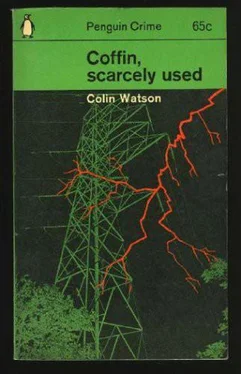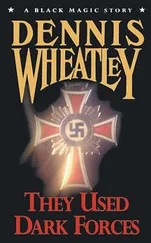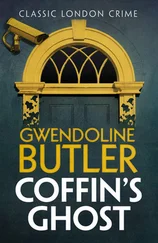“Nonsense. He’s just a provincial copper, dig-digging into what he doesn’t understand and hoping for good luck to save his reputation in the eyes of that timid old goat of a Chief Constable. He knows nothing and he’ll find nothing. Always provided”—Hillyard’s cheek twitched in the firelight—“that you and I and friend Gloss remain helpfully obscure and unproductively cooperative.”
Bradlaw grunted. “Roddy Gloss is just a shade too clever sometimes. Keeping up with him can be dodgy.”
“Never mind that. He’ll not take any risks. And he’ll have the sense not to lead you into any.”
“I don’t know what you mean by risk if you think he’s not asking for trouble by the line he’s given old Chubb. You realize what he’s going to tell Purbright as soon as he’s questioned? Which he will be. Even if it hasn’t happened already.”
“Stop talking in bursts, and stop frightening yourself like an old woman. Damn me if you thrombosis fatties aren’t all the same.”
Bradlaw, peeved, sat up in his chair. Hillyard took no notice of him but glowered at his own outstretched feet and said slowly: “We seem to have got away from the main point again, don’t we?”
“Eh?”
Hillyard felt in his pocket and drew out a battered cigarette. This he lit with a strip of paper that he tore methodically from the margin of one of the medical journals scattered on the floor by his chair. Quietly, almost sadly, he said: “There’s only one way we can find him.”
“You’ll not get it out of her.”
“I don’t propose to try any more.”
“Well, then...”
“Listen. A patient of mine—one of the more grateful ones—works at the telephone exchange...”
Hillyard spoke gently and without banter now. Bradlaw, nervous and doubtful, tried to look intelligent.
Behind the change in the manner of each lay common recognition of the need to be serious and to waste no time. Fear perched in the room.
Chapter Nine
The photograph that Purbright pushed across his desk to Love was an enlargement of a hand. The sergeant gave an involuntary jump. A hand, disconnected and twice life-size, can be a startling exhibit when unexpectedly revealed to a man preoccupied with nothing more sinister than desire for an early tea.
Love stared obligingly at the picture.
“Well?” asked Purbright.
Love turned the photograph sideways, then upside down. “Fine prints old Hastings gets,” he remarked.
Purbright was patient. “What do you make of the flower? There, look.” He leaned over and traced faint lines, broken but forming part of a general symmetry over the main area of the open palm. They were suggestive of a formalized daffodil.
“The burns?” said Love.
“Yes.”
“They show the shape of what he must have grabbed, I suppose.”
“Correct.”
“So when we find a metal object of the same shape and size that could have been connected to the mains or a cable last Monday night, we’ll be a fair way towards knowing how and where old Gwill was done.”
Purbright beamed as if upon a favourite pupil. “You are sharp today, Sid. I think we might make the best of it and go detecting, don’t you?”
The lugubrious Mrs Poole admitted them to The Aspens with the air of a landlady opening the door for lodgers who had forgotten their keys. She seemed resigned to the prospect of the police popping in and out for the rest of her life, which, judging from her aspect, she had no desire to be prolonged.
Purbright showed her a sketch of the marks on the photographed hand. He did not say what they were, but asked if she could think of any metal object about the house of which the sketch reminded her.
She stared at the drawing, moving her head to one side, then the other. “I’ve seen something like it,” she murmured, “but where, I can’t think.”
“Outside, perhaps?” Purbright prompted.
She shook her head. “You see carvings like that on church pews sometimes. But you said metal, didn’t you? Brass or iron, that would be. What about bedsteads, then?”
“Bedsteads?”
“Yes. The old-fashioned ones, you know. There are things like that on some of those I’ve seen. Like flowers between the rails at the head and foot.” She handed back the piece of paper.
Purbright asked her: “Is there a bedstead of that kind here?”
“Only mine, sir,” said Mrs Poole, “but truth to tell I can’t remember offhand what the metal parts of it are like, except for the knobs, of course, and not all of them are still there. You’d better come and see.”
But upon Mrs Poole’s gaunt bed rails there was no decoration at all, save one large and tarnished brass ball. “It’s funny how you can sleep on something for years and not really notice what it looks like,” she said, modestly thrusting a forgotten corset out of sight.
Purbright stared carefully round the room. It contained no daffodils of iron or of anything else. “Perhaps we’d better take a quick look into the other rooms, now that we’re here—if that wouldn’t inconvenience you, Mrs Poole.”
That was all right, she assured him. Having seen to her own little night-box of privacy being closed up snug and naphthascented once again, she left them and descended to whatever forlorn tasks she still found to do in the deserted house.
The two policemen looked into all the other upstairs rooms. Only the two largest bedrooms were furnished. Both their beds were of wood. Of metal-work there was no trace, except for one gas bracket that had been left for some obscure reason sprouting from a landing wall like a dead and dusty plant.
Purbright watched for power points. There was one in each of the large bedrooms and three more along the corridor and landings. He examined each carefully. All had a thick film of dust around the sockets.
They continued the search downstairs. It revealed nothing suggestive apart from four more power points, three of them dusty, and a roll of wire in the meter cupboard. Love tugged at this expertly and shook his head. “Bell wire—no use for mains,” he said.
They halted in the study-like room and stared out into the garden, with its dripping laurels. The house around them seemed damp and secretive and sorry for itself. “We’ll get nothing more here, I doubt,” said Purbright.
“Do you believe Gloss’s story?” Love asked him.
“Up to a point. I think they were all here that night. Gwill and Gloss and Hillyard and Bradlaw.”
“Bradlaw, too?”
“I’d be much surprised if he wasn’t. They were in something or other together and on Monday night there must have been a development of such importance to all of them that a conference of some kind became necessary. Either that, or else the other three came here by arrangement among themselves to put Gwill out of the way.”
“Electrocution seems an uncertain way of going about it.”
“Not at all. If only you can make sure your victim is nicely earthed—in a bath is the classic position—a shot of ordinary mains current is just as effective as a cannon ball.”
“You think he was actually killed here, then?”
“It’s the most likely place if there was a conspiracy.”
“If he was murdered here,” said Love, “they all must have been concerned to some extent. One of them could hardly have knocked him off without the others being aware of it. And it would have taken more than one man to carry the body over to the field afterwards.”
Purbright frowned. “There’s something queer about the story of the man Gloss. He mentioned Gwill’s having been eating up to the time of leaving the house. We know that to be correct. It lends strength to his tale, great strength. Had Gwill been murdered here by Gloss and Bradlaw and Hillyard, or any one or two of them, that particular twist in the account would never have been included.”
Читать дальше












